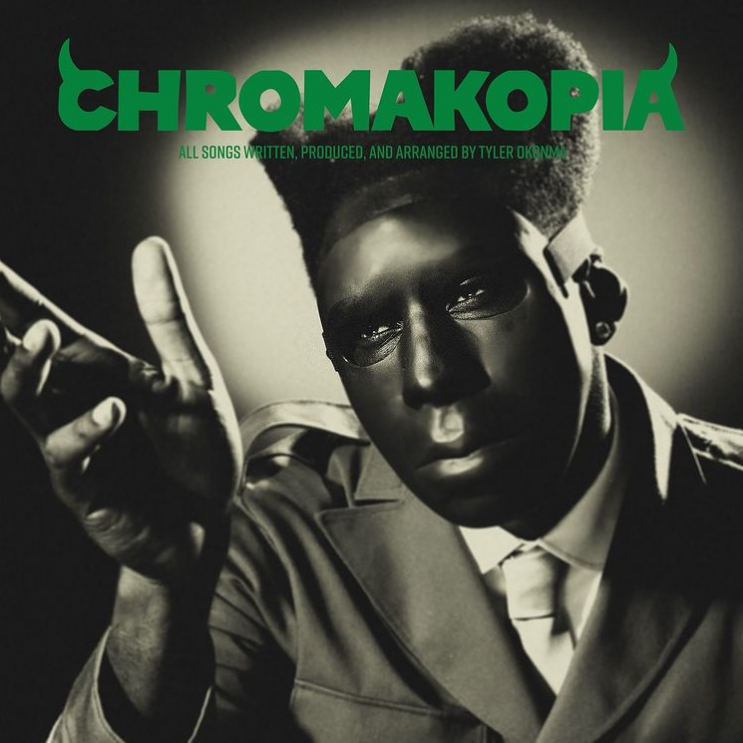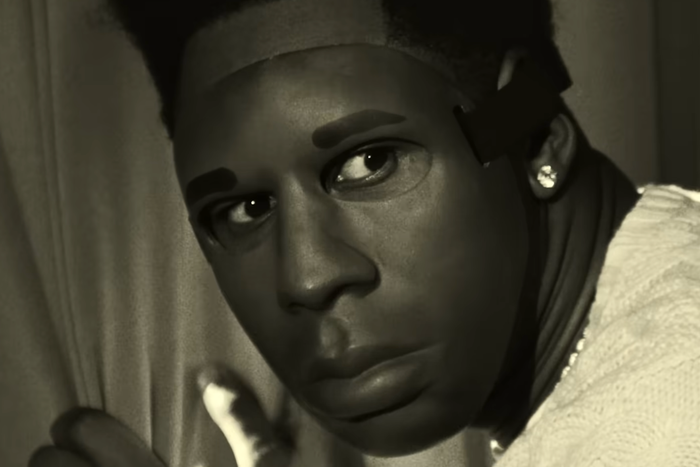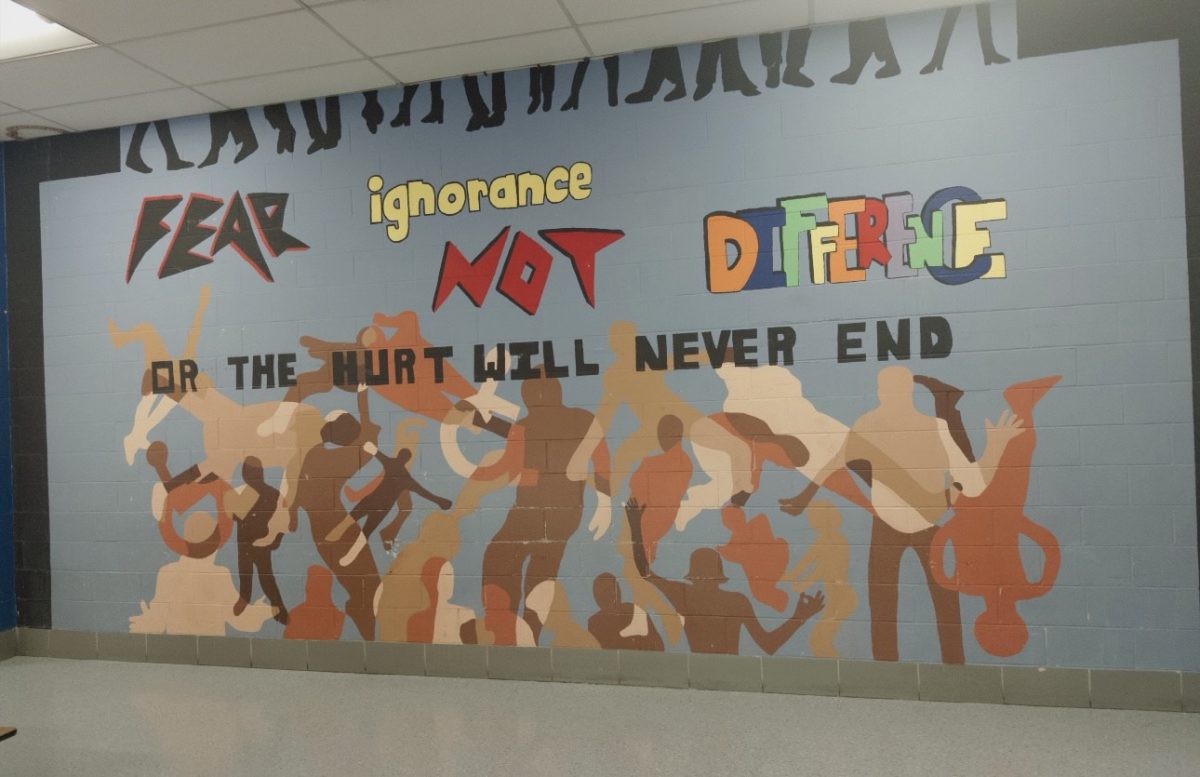CHROMAKOPIA. Chroma-kopia. Χρωμα – copiae: a surplus of colors. /kʰrɔ̂ː.ma/ /ˈkoː.pi.a/

Tyler, The Creator never fails to get people talking and get cameras flashing. As soon as the internet got wind of CHROMAKOPIA, it seemed as though everyone turned and stared. Chromakopia is heavy and at times dark, and yet full of light, a sound that has become Tyler’s trademark. On this record, he takes a special inspiration in rock, from Black Sabbath to the Ngozi family, hammering in that deep and focused sound.

The album is also an addition to the worldbuilding and lore that Tyler has made through his music over the years. St. Chroma is the first track on the record, as well as the name of the character featured in this installment. Fans have speculated St. Chroma to be named after Chroma the Great, a fictional character from The Phantom Tollbooth by Norton Juster. Chroma the Great is a conductor, and it’s his job to color the world with the music he conducts. Without Chroma, there would be no color in the world.

Despite the album’s title, St. Chroma and the world of Chromakopia is entirely black and white, save for the staple shade of green on every piece of Chromakopia promotion. St. Chroma is portrayed as a dictator type of character, wearing a military uniform, a mask, and a hairstyle in the shape of two horns. The sound of rhythmic marching can be heard in the first track, as well as low chanting. Based on this and the music videos released, we’re given a feeling of unease and fear, with many people expecting Chromakopia to be aggressive and wildly explicit, or at the very least, lore-heavy. What we got was much more complex.
Chromakopia continues the criticism from artists about parasocialism and stalker behavior from fans. It’s not a new theme, especially not for Tyler, seeing as he has written songs about this before (see: Colossus and DOGTOOTH). In the past, Tyler has written, “Don’t call me king, I’m not your twin / I’m not your brother, we just met,” and of course there was that one time at Six Flags. In “Noid,” however, Tyler takes a different approach, speaking on a paralyzing fear of being killed or harassed by his neighbors, fans, and whoever else might be watching.
With Chappell Roan’s outspokenness about the same subject (calling out paparazzi, telling fans not to ask for pictures, wearing disguises in public), this is an issue that has once again risen to the top of the public mind. What is the dynamic between fans and celebrities? How has clout-chasing and the modern age warped our view of celebrities, and why do we think ourselves entitled to anything other than what an artist officially releases for us? We can’t know for sure what it feels like to exist to the public as an icon or symbol like Tyler does, but we can guess that it’s terrifying. His art has been diluted and taken advantage of. The wider it spreads, the more shallow it is when it reaches people. In the words of Childish Gambino, “Y’all ain’t real fans, though.”

Tyler also critiques fan behavior by calling out bandwagoners and washed-up aspiring rappers, saying that money gets to people’s heads and they don’t do anything meaningful with it. He also reflects on his own choices, though, noting that all he has are “photos of my ‘Rari” and some “silly suits” to show for his life. He shows a deep degree of maturity across the record, and it’s clear that he has come a long way from the Tyler that put out Bastard and Goblin. The album maintains his gravelly voice and aggressive style, but his lyrics reveal that Tyler has some softness and wisdom beneath his persona, too.
This maturity is especially visible in “Take Your Mask Off.” Chromakopia’s visuals are scattered with masks everywhere, which now seem to symbolize the facades we put over our true selves, trying to appear stronger, harder, or cooler. “Take Your Mask Off” is all about how men often throw themselves into a life of coldness, crime, and disloyalty because they’re too afraid to confront the softness inside them. Tyler speaks directly to these men, saying, “I hope you find yourself.” In the end, he wishes them the best, despite all of the dreams and prosperity they’ve thrown away to pursue a hostile persona. Perhaps, though, he sees himself in them, and that’s why he is kind to them.
The lyrics in “Like Him,” such as “Do I look like him? / I don’t look like him,” also calls attention to how Tyler experiences manhood and masculinity differently from others. It’s about how he carries pieces of his father in him but doesn’t know anything about his dad, and wonders if he’s missing a piece of himself. He then says, “Everything worked out without him,” accepting that there’s no point in “chasing a ghost.” The man Tyler has become resembles his father, and yet, has developed in his father’s absence.
In “Balloon,” he further dives into themes of masculinity, talking explicitly about his same-sex attraction and how he doesn’t want what’s popular because it’s shallow. Doechii, a bisexual female rapper (and recently, drag king), is featured on this track with Tyler. The discussion of queer themes seems to get more open the more Tyler’s music progresses, and it likely has to do with his personal growth and acceptance of himself.

In the same vein, Chromakopia is about Tyler and his own life. He meditates on his career and its direction, whether or not to settle down, being true to himself, aging, handling opportunists and naysayers, and flexing to a degree that none of us can relate to. It’s not necessarily meant to be relatable to the listener. For this reason, we are forced to think about a world completely outside of our element. We can’t relate to T’s lifestyle, and in fact, sometimes the people he’s dissing are us. It takes us out of this echo chamber of music fitting into our own lives and becoming what we want out of it. Instead, Chromakopia is stimulating us to consider things we otherwise wouldn’t.
A trend appearing in music lately is a resistance to the anti-intellectualism that short-form social media has birthed. Because information (and misinformation) is so easily accessible, we no longer need or want to put in the effort to learn or think for ourselves. We don’t even type our own searches on TikTok anymore—we just click on a blue comment. This also means that we listen very passively to music; we don’t interact with it on a deeper level, we don’t analyze it, we don’t form our own opinions, we don’t diversify our music library. Tyler consistently encourages the listener to really think about intention. On the morning of Chromakopia’s release, he said on Instagram, “Make sure you listen in full with no expectations. No distractions, no checking text or social media, letting others paint your thoughts on sh*t before you get a chance. Thank you.”

Tyler’s choice of release date is also intentional and meaningful. Some fans have pointed out that it’s Frank Ocean’s birthday, anticipating a feature. However, Tyler said of the release date that “it’s a lot of passive listening [on the weekend]. If you put it out during the week… you really have that time to ‘dive in’ and really listen.” Hence, 6 a.m. on a Monday.
Throughout the album, we repeatedly hear the voice of Bonita Smith, Tyler’s mother. She acts as a mentor, giving advice to Tyler on trust, fame, family, love, sex, the future, and self-worth. She’s a constant reminder of where Tyler came from, who he is, and where he’s going. A strong maternal figure constantly watching over the album gives the listener the feeling that Chromakopia is actually a lot warmer and wiser than it might have initially seemed. Smith finishes the album by expressing how proud she is of Tyler.
At the end of the day, Tyler is an artist who has fought a long way to give the music scene the wisdom and innovation he embodies. There’s a photo trend on TikTok right now where you show off how you’ve grown throughout the release of Tyler’s numerous albums, from 2011 to 2024. And an online slideshow is pretty cool. An online slideshow is something you can look at and forget about. The things that got you there, though, the albums slaved over, awaited, listened to, and even never released are what made you, and what made Tyler, the Creator. If any of Tyler’s last releases made you wonder what’s next?, if the gaps between releases made you think he’s dead, CHROMAKOPIA makes you think, I’m proud of you.
But that’s just me. Think what you want.

This has been the 10th(!) installment of Sound Check with Jules. Tune in biweekly to hear about music history, review, recommendations, analysis, culture, and more. To listen to CHROMAKOPIA, click here.



















